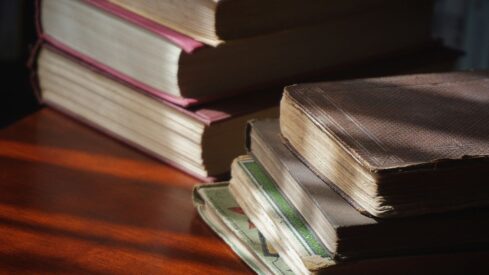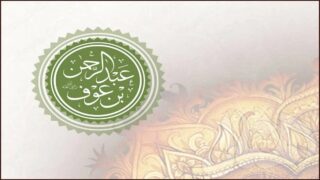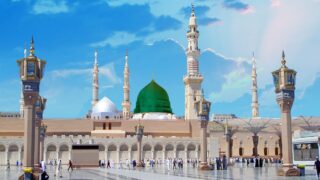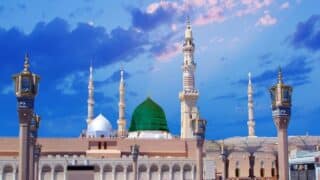At Shaykhan, halfway between Madinah and Mount Uhud, the 1,000-strong Muslim army led by Prophet Muhammad stopped. The sun had begun to sink beneath the horizon.
The Prophet (peace and blessings be upon him) alighted from his horse, As-Sakb. He was fully dressed for battle. A turban was wound around his helmet. He wore a breastplate, beneath which was a coat of mail fastened with a leather sword belt. A shield was slung across his back. His sword hung from his side.
As the sun set, Bilal called the Adhan (call to Prayer) and the Prayer was offered. The Prophet then reviewed his troops once more, and it was then that he noticed in their midst eight boys who, despite their young age, were hoping to take part in the battle. Among those boys were Zayd’s son, Usamah, and `Umar’s son, `Abdullah, both only 13 years old.
The Prophet ordered them all to return home immediately. Two of the boys, however, demonstrated that they were able fighters. They were thus allowed to accompany the army in the Battle of Uhud. Usamah ibn Zayd, `Abdullah ibn `Umar, and the other boys were sent back to their families.
A Young Believer
From an early age, `Abdullah ibn `Umar thus demonstrated his keenness to be associated with the Prophet in all his undertakings. He had accepted Islam before he was 10 years old and had made the Hijrah (immigration to Madinah) with his father and his sister, Hafsah, who would later become a wife of Prophet Muhammad.
Before Uhud, Ibn `Umar was also turned away from the Battle of Badr, and it was not until the Battle of the Trench that he and Usamah ibn Zayd (both now 15 years old) and others of their age were allowed to join the ranks of men taking part in digging the trench and also fighting in the battle.
From the time of his Hijrah till the time of his death (more than 70 years later), Ibn `Umar distinguished himself in the service of Islam. He was dubbed the good man, son of the good man, according to Abu Musa Al-Ash`ari. He was known for his knowledge, humility, generosity, piety, truthfulness, incorruptibility, and constancy in performing acts of worship.
Ibn `Umar learned a great deal from his father, `Umar ibn Al-Khattab, the distinguished and close Companion of the Prophet. It was indeed a great favor bestowed by Almighty Allah upon both of them, among others, that they could learn under the greatest teacher of all, the Messenger of Allah.
A Keen Follower in The Footsteps of The Prophet
Ibn `Umar used to observe and pay meticulous attention to every statement made by the Prophet and every action he would take in all different situations and various events. Then, he would practice what he observed in a meticulous and devoted manner.
For example, if Ibn `Umar saw the Prophet perform Prayer in a particular place, he would later pray in the very same place. Also, if he saw the Prophet make a supplication while standing, he would also supplicate while standing. Conversely, if he saw him invoke Almighty Allah while sitting, he would also do the same.
Moreover, if, on a journey, he observed that the Prophet descended from his camel at a particular place and offered two rak`ahs (units of Prayer) and it later happened that he passed through the same route, he would stop just at the same place and perform two rak`ahs.
In a particular place in Makkah, he once observed that the Prophet’s camel made two complete turns before the Prophet dismounted and performed two rak`ahs. It may well be that the camel did so involuntarily and that this was unintended by the Prophet himself. However, when it happened that Ibn `Umar was in the same place at a later time, he made his camel do exactly what the Prophet’s camel had previously done; then he performed two rak`ahs.
Having noticed Ibn `Umar’s devotion to the Prophet, `A’ishah (may Allah be pleased with her) remarked, “There was no one who followed in the footsteps of the Prophet (peace and blessings be upon him) in the places where he alighted as Ibn `Umar did.”
In spite of his close observance of the Prophet’s actions, Ibn `Umar was extremely cautious and even afraid of reporting the Prophet’s sayings. He would only relate a hadith if he was completely sure that he remembered every word of it. One of his contemporaries said,
Among the Companions of the Prophet, no one was more cautious about adding to or subtracting from a hadith of the Prophet than `Abdullah ibn `Umar.
Similarly, he was extremely cautious and reluctant to issue religious rulings (fatwas). Once, someone came to him asking for a judgment on a particular matter, and thus came his reply, “I have no knowledge of what you ask.” The man went on his way and Ibn `Umar clapped his hands in glee and said to himself, “The son of `Umar was asked about what he does not know, and he simply said, ‘I do not know!'”
Fearful as he was of issuing fatwas, Ibn `Umar was therefore unwilling to be a judge, even though he was well qualified to be one. The position of judge was one of the most important and respectable offices in the Muslim society and state. It would bring with it honor, glory, and even riches.
Ibn `Umar, however, declined this position when it was offered to him by Caliph `Uthman ibn `Affan. The reason was not that he underestimated the position of judge — he feared to issue erroneous judgments in matters pertaining to religion. `Uthman ibn `Affan then made him agree not to disclose his decision lest it might influence the many other Companions who had actually assumed the posts of judges and juristic consultants.
A Prophetic Advice
To Hafsah (Ibn `Umar’s sister), the Prophet once said,
“What a blessed man `Abdullah is! Should he perform Prayer at night, he would be blessed even more.” (Al-Bukhari)
From that day on, Ibn `Umar never abandoned Qiyam Al-Layl (Night Vigil Prayer), whether at home or on journeys. In the stillness of the nights, he would remember his Lord much, perform Prayer, recite the Qur’an, and weep. That is why he was once described as brother of the night.
Like his father, he would readily tear, especially upon hearing or reciting the warning verses of the Noble Qur’an. `Ubayd ibn `Umayr related that one day he recited the following verses to Ibn `Umar:
(How will it be, then, when We bring from every people a witness and bring you as a witness against these? On that day, those who disbelieved and disobeyed the Messenger will wish that the earth were leveled with them, and they shall not hide any word from Allah) (An-Nisaa’ 4:41–42)
Upon listening to the verses, Ibn `Umar cried until his beard was moist with tears. On another occasion, while he was sitting with some close friends, he read,
(Woe to the defrauders, who, when they take the measure (of their dues) from people take it fully, but when they measure out to them or weigh out for them, they cause them loss. Do not these think that they shall be raised again, for a Mighty Day — the day on which (all) humankind shall stand before the Lord of the worlds?)(Al-Mutaffifin 83:1–6)
At this point, he kept on repeating The day on which (all) humankind shall stand before the Lord of the worlds? over and over again and weeping until he fainted.
Piety, simplicity, and generosity combined in Ibn `Umar to make him a person highly esteemed by the Companions and those who came after them. He gave generously and did not mind parting with wealth even if he himself would be in want as a result.
Wealth: A Servant Not A Master
He was a successful and trustworthy trader throughout his life. In addition to this, he would receive a generous stipend from Bayt Al-Mal (the Treasury), which he would often spend on the poor and those in need. Ayyub ibn Wa’il Ar-Rasi recounted one incident of Ibn `Umar’s generosity. He said,
One day, `Abdullah ibn `Umar received 4,000 dirhems and a velvet blanket. The following day, I saw him in the market buying fodder for his camel on credit!
Upon this, I went to his family and asked, “Didn’t Abu `Abdur-Rahman [meaning `Abdullah ibn `Umar] get 4,000 dirhems and a blanket yesterday?”
“Yes, indeed,” they replied.
“But I saw him today in the market buy fodder for his camel, and he had no money to pay for it,” I then remarked.
“Before nightfall yesterday, he had parted with it all. Then, he took the blanket and threw it over his shoulder and went out. When he returned, it was not with him. We asked him about it, and he said that he had given it to a poor person,” they explained.
Ibn `Umar encouraged the feeding and helping of the poor and the needy. Often when he ate, there were orphans and poor people eating with him. He rebuked his children for treating the rich well and ignoring the poor, saying, “You invite the rich and forsake the poor.”
For Ibn `Umar, wealth was a servant, not a master. It was a means serving to attain the necessities of life, not luxuries. This attitude and view adopted by him were further reinforced by his asceticism and simple lifestyle.
One day, a friend of his came from Khorasan and brought him a fine, elegant piece of clothing. “I have brought this garment for you from Khorasan,” he said, “You would certainly find delight in it. I suggest that you take off these coarse clothes and put on this beautiful garment.”
“Show it to me then,” said Ibn `Umar. After touching it, he asked, “Is it silk?” “No, it is cotton,” replied his friend. For a little while, Ibn `Umar was pleased; then with his right hand, he pushed away the garment and said, “No! I am worried about myself. I fear that it shall make me arrogant and boastful. And, indeed, Almighty Allah does not love any arrogant, boaster.”
Imam Maymun ibn Mahran related,
I entered the house of Ibn `Umar and estimated everything in it, including his bed, his blanket, his carpet, and everything else therein. What I found was not a hundred dirhems’ worth.
That is not because Ibn `Umar was a poor person. Verily, the fact is quite other: He was rich. Also, he was not a miser; indeed, he was such a generous and openhanded man.
Source:
This is compilation of the stories/biographies of The Prophet Muhammad ‘s Companions obtained from many resources (books, internet, etc.). Excerpted with modification from www.youngmuslims.ca


















